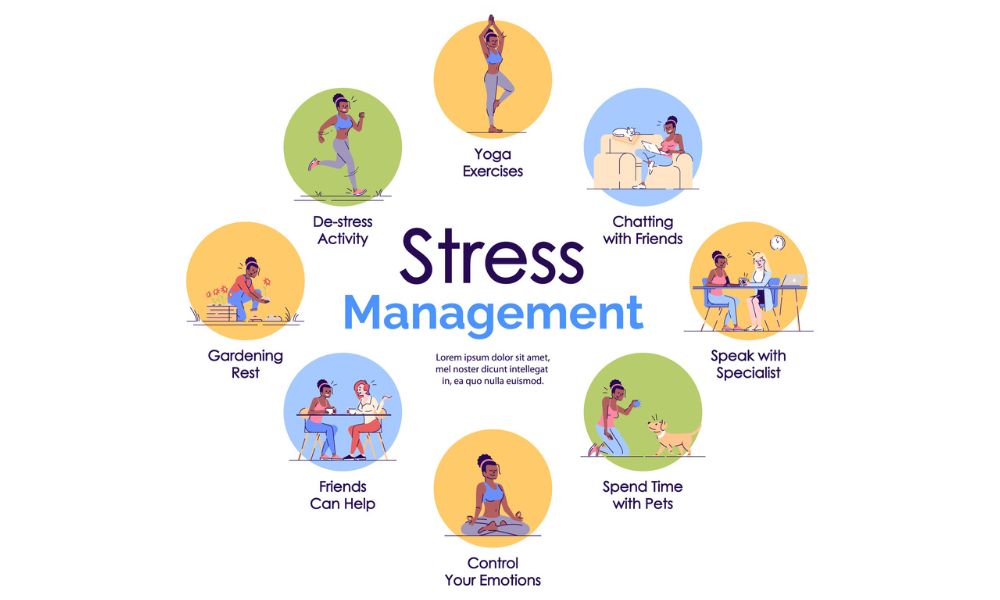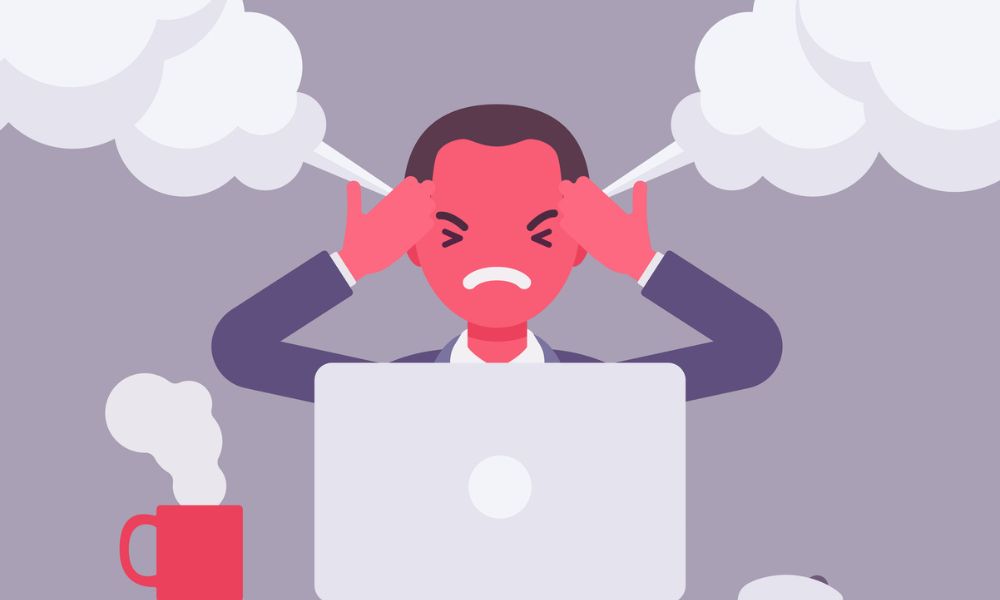Anger and stress are two powerful emotions that can significantly impact our lives. Understanding how they connect helps us recognise the effects they have on our mental health and well-being. When we face stress, it can lead to feelings of anger. Conversely, unmanaged anger can create more stress, forming a challenging cycle that affects our daily lives.

Breaking this cycle requires awareness and effective strategies. We can learn to manage our emotions through practical techniques that promote emotional regulation. Exploring our responses to stress and anger can lead to healthier coping mechanisms, enhancing our overall well-being and allowing us to respond more calmly to life’s challenges.
Key Takeaways
- Anger and stress are interconnected and influence our mental health.
- Recognising our emotional responses can help us break the cycle.
- Practical strategies can lead to healthier coping mechanisms.
Understanding Stress and Anger

Stress and anger are closely linked emotions that can greatly impact our mental and physical health. By understanding their physiological and psychological aspects, we can learn effective ways to manage them.
Physiology of Stress and Anger
When we experience stress, our body triggers a response known as the "stress reaction." This involves the release of hormones like adrenaline and cortisol. These hormones prepare us for a "fight or flight" situation, increasing our heart rate and energy levels.
When anger arises, it often stems from stress. Our body reacts similarly, heightening our physical responses and making us feel tense. This cycle can lead to heightened irritability and aggression. Recognising these bodily changes helps us identify when we are getting stressed or angry, allowing us to take action before it escalates.
Psychological Perspectives
From a psychological standpoint, our thoughts and beliefs significantly shape how we respond to stress and anger. Cognitive-behavioural therapy (CBT) can be useful in addressing these emotions. CBT focuses on identifying negative thought patterns that fuel our anger or stress.
By challenging these thoughts, we can develop healthier coping strategies. For instance, reframing a stressful situation can transform our emotional responses. We can learn to express our anger constructively rather than letting it control us. Gaining insight into these psychological connections empowers us to regain control over our feelings.
The Impact of Stress and Anger on Health

We should recognise that stress and anger can significantly affect both our physical and mental health. Understanding these impacts is crucial for managing our emotions and maintaining our well-being.
Physical Health Risks
Stress and anger can lead to serious physical health issues. When we experience anger, our body releases hormones like adrenaline and cortisol. This response prepares us for immediate action but can be harmful if it happens too often.
Repeated activation of this response can raise our heart rate and blood pressure, increasing the risk of heart disease. Chronic stress can also weaken our immune system, making us more susceptible to infections. In addition, it can lead to digestive problems like irritable bowel syndrome.
Maintaining a healthy lifestyle, including regular exercise and a balanced diet, can help offset these risks. Managing stress is essential to our physical health.
Mental Health Effects
The connection between anger, stress, and mental health is profound. When we let anger take control, it can fuel negative emotions such as anxiety and depression. We often find ourselves trapped in a cycle where stress increases our anger, which then intensifies our stress.
This cycle can lead to trauma and worsen our overall well-being. Common mental health symptoms include irritability, restlessness, or difficulty concentrating. If we do not address these feelings, they can lead to more severe conditions.
Practising techniques like mindfulness or talking to someone can help manage these emotions. It is important we seek support when needed, as this can significantly improve our mental health.
Cognitive-Behavioural Therapy (CBT) Approach

Cognitive-Behavioural Therapy (CBT) is an effective method for addressing anger and stress. This approach helps us understand the thoughts and behaviours that contribute to our emotional responses. We can gain better emotional regulation and develop healthier coping strategies through specific techniques.
Principles of CBT
CBT is built on several key principles that guide its practice. The main idea is that our thoughts, feelings, and behaviours are interconnected. Negative thought patterns can lead to unhealthy emotions and actions.
In CBT, we focus on identifying and changing these patterns. This involves recognising irrational beliefs and reframing them into more positive, realistic thoughts. We also learn to challenge distorted thinking, which can contribute to feelings of anger.
By applying these principles, we can break the cycle of negative emotions. CBT encourages self-reflection and awareness, helping us understand triggers for our anger. This awareness allows us to respond to situations more calmly.
Applying CBT to Anger Management
When applying CBT to anger management, we use specific techniques to cope with anger effectively. One common technique is developing skills for emotional regulation. We can learn to pause before reacting, allowing time to process our feelings.
Another important strategy is practising deep breathing and relaxation exercises. These methods help calm our minds and bodies during stressful situations. Journaling can also be a useful tool; writing down our thoughts allows us to identify triggers and patterns.
We can also use role-playing to rehearse responses to anger-inducing situations. This practice prepares us for real-life encounters, allowing us to react more positively.
By consistently applying these techniques, we can reduce our anger and build healthier relationships. CBT provides us with the tools to manage our emotions more effectively and improve our overall well-being.
Practical Strategies for Emotional Regulation

We can use several effective strategies for emotional regulation that can help manage anger and stress. These techniques focus on building awareness and resilience, allowing us to respond to emotions in healthier ways.
Mindfulness and Meditation
Practising mindfulness helps us stay present and aware of our feelings. We can develop this skill through meditation, which encourages us to observe our thoughts without judgement. Regular meditation for just a few minutes each day can reduce emotional reactivity.
To start, we can set aside a quiet space and focus on our breath. If our mind wanders, we gently bring our attention back. This practice enhances our emotional intelligence by increasing our awareness of triggers and reactions.
Steps to Practice Mindfulness:
- Find a quiet location.
- Sit comfortably with eyes closed.
- Take deep breaths and focus on inhaling and exhaling.
- If distracted, return focus to breathing.
Physical Exercise
Engaging in physical exercise is a powerful method for emotional regulation. When we exercise, our bodies release endorphins, which can improve our mood and reduce feelings of stress. Regular physical activity, such as walking, running, or yoga, enhances our resilience to anger.
We should aim for at least 30 minutes of moderate exercise most days of the week. This routine not only helps manage stress but also promotes overall well-being.
Benefits of Exercise on Emotions:
- Reduces Stress: Physical activity lowers cortisol levels.
- Boosts Mood: Exercise releases endorphins.
- Enhances Sleep: Regular activity improves sleep quality, crucial for emotional balance.
Visualization Techniques
Visualization techniques allow us to imagine positive outcomes and calm environments, helping us manage our emotions. By picturing ourselves in a peaceful setting or envisioning successful interactions, we can reduce anxiety and prepare for challenging moments.
To use this technique, we can close our eyes and visualise a relaxing place, such as a beach or forest. Imagining specific details can increase the effectiveness of this practice.
Steps for Effective Visualization:
- Close your eyes in a comfortable position.
- Picture a tranquil setting using all your senses.
- Spend a few minutes immersed in this imagery, focusing on feelings of peace.
These strategies can help us break the cycle of anger and stress, leading to better emotional health.
Developing Healthy Coping Mechanisms
Coping with anger and stress involves finding healthy ways to manage our emotions. We can build skills that help us respond to these feelings positively. In this section, we will explore the role of forgiveness, the importance of building resilience, and seeking support through counselling.
The Role of Forgiveness
Forgiveness is a powerful tool in managing anger. When we hold onto grudges, we create more stress. By forgiving, we release negative emotions and open ourselves to positive feelings.
To practice forgiveness, we can start by acknowledging our feelings. This means recognising our anger without judgement.
Next, we can reflect on the situation. Understanding why someone acted a certain way can help us gain perspective. We can remind ourselves that everyone makes mistakes.
Finally, we can choose to let go. This doesn’t mean we forget, but we decide not to let anger control us. In doing this, we promote emotional wellness and free ourselves from the burdens of past hurts.
Building Resilience
Resilience allows us to bounce back from stressful situations. To build resilience, we should focus on our coping strategies. One effective method is to develop a positive mindset.
We can challenge negative thoughts by replacing them with positive affirmations. For example, instead of saying, “I can’t handle this,” we can say, “I can manage this situation.”
Another way to build resilience is through setting realistic goals. When we achieve small goals, we boost our confidence and emotional wellness.
Regular self-care also strengthens resilience. This can include physical activities, like walking or yoga, which help release stress. By cultivating these habits, we create a strong foundation to deal with anger and stress in a healthy way.
Seeking Support and Counselling
Seeking help is a vital step in managing anger and stress. We can talk to friends or family members who can offer support. Sharing our feelings helps lighten our emotional load.
Counselling provides a safe space to explore our emotions. A trained professional can guide us through our anger and stress. They can teach us coping strategies tailored to our needs.
Counselling sessions often focus on improving communication skills. This helps us express our feelings without escalating conflicts. Through these conversations, we learn to manage our emotions in a constructive manner.
By reaching out for help, we take proactive steps toward emotional wellness and a more balanced life.
Anger Management Techniques
We can adopt various strategies to manage anger effectively, leading to healthier emotional responses. Two key approaches include anger management classes and developing strong communication skills. Both are pivotal in reducing the cycle of anger and stress.
Anger Management Classes
Anger management classes provide structured support for those with anger issues. In these classes, we learn about the triggers that lead to anger and develop coping strategies to handle intense emotions.
The curriculum often includes:
- Recognising Triggers: Identifying situations that provoke anger.
- Coping Techniques: Practising relaxation exercises, such as deep breathing or mindfulness.
- Emotional Awareness: Understanding our emotional pain to respond rather than react.
With the help of professionals, we can explore our emotional reactions and discover healthier outlets for our feelings. For those struggling with anger, these classes can create a safe space for change.
Communication Skills
Effective communication is crucial for managing anger. When we express our feelings clearly and calmly, we reduce misunderstandings that can lead to conflict.
We can improve our communication skills by:
- Active Listening: Focusing on what others say before responding.
- Using "I" Statements: Expressing our feelings without blaming others, such as "I feel upset when…".
- Staying Calm: Maintaining a steady tone, even during disagreements.
By improving these skills, we can break the cycle of anger and stress in our relationships. This leads to healthier interactions and greater emotional control.
Lifestyle Changes for Stress Reduction
Making lifestyle changes can greatly impact our stress levels and help us find balance. Addressing diet, relaxation habits, and physical activity can lead to significant improvements in our well-being and productivity.
Diet and Nutrition
Nutrition plays a vital role in managing stress. A balanced diet rich in whole foods can improve mood and energy levels. We should focus on incorporating fruits, vegetables, whole grains, and lean proteins into our meals.
Certain foods, like those high in omega-3 fatty acids, can help reduce anxiety. Examples include salmon, walnuts, and flaxseeds. Staying hydrated is also crucial, as dehydration can increase stress levels.
Limiting caffeine and sugar intake can help stabilise mood swings. Instead, we can opt for herbal teas or water. It's essential to practice mindful eating, taking the time to enjoy our meals and recognise our hunger cues.
Rest and Relaxation
Rest and relaxation techniques are essential for reducing stress. Prioritising sleep is crucial; aiming for 7-9 hours of quality sleep each night can enhance our focus and resilience.
We can adopt relaxation practices, such as deep breathing or mindfulness meditation. These help calm the mind and promote emotional regulation. Setting aside time for leisure activities we enjoy can also be beneficial.
Taking breaks throughout the day can improve productivity. Even short pauses to stretch or take a few deep breaths can re-energise us. Creating a calm sleep environment, free from distractions, can further support restful nights.
Yoga and Movement
Physical activity is key to stress management. Yoga combines movement with mindfulness, making it an excellent way to alleviate tension. Regular practice can boost our mood and enhance our focus.
We can explore various yoga styles, such as Hatha or Vinyasa, to find what resonates with us. Incorporating stretching and breathing exercises can relieve muscle tension and lower stress hormones.
In addition to yoga, daily movement, like walking or dancing, contributes to our well-being. Engaging in physical activity releases endorphins, which are natural stress relievers. By making movement a regular part of our lives, we foster a healthier mind and body.
Frequently Asked Questions
In this section, we will address common inquiries regarding anger and stress. Understanding effective methods for managing anger can significantly improve our emotional well-being and relationships.
What are effective methods for immediate anger control?
To control anger in the moment, we can use techniques like deep breathing and counting to ten. These methods help calm our mind and body. We can also try visualisation, such as imagining a peaceful scene, to shift our focus away from the anger.
What strategies can help overcome anger sustainably?
For long-term management, we can practise mindfulness and self-reflection. Writing in a journal about our feelings can also provide clarity. Regular physical activity is beneficial, as it promotes mood improvement and helps release built-up tension.
What approaches are there to manage anger within romantic relationships?
In romantic relationships, open communication is key. We should express our feelings honestly and without blame. Setting aside time to discuss issues calmly can help us understand each other better and reduce conflicts.
How can someone prevent frequent anger outbursts?
To prevent outbursts, we can identify our triggers and work on recognising them before they escalate. Establishing healthy routines, such as regular sleep and exercise, can also help maintain emotional balance.
What can be done when resentment and anger form a persistent cycle?
When resentment builds up, addressing underlying issues is crucial. We can benefit from talking to a trusted friend or therapist to gain perspective. Learning to forgive, both ourselves and others, can break the cycle of persistent anger.
How is stress linked to anger and what strategies can mitigate both?
Stress and anger often feed into each other. We can reduce stress through relaxation techniques like yoga or meditation. By managing stress effectively, we may also notice a decrease in anger outbursts.





















